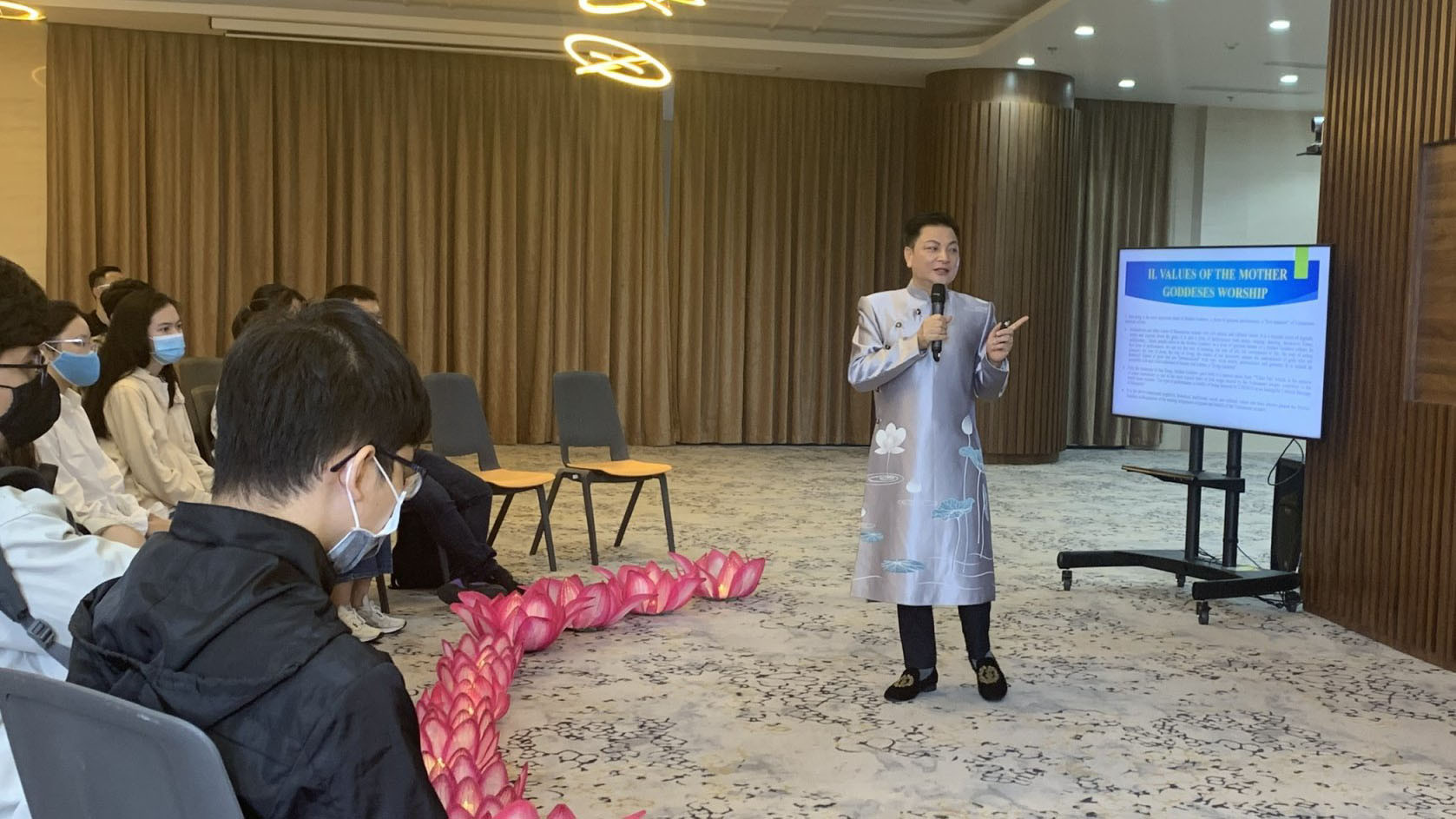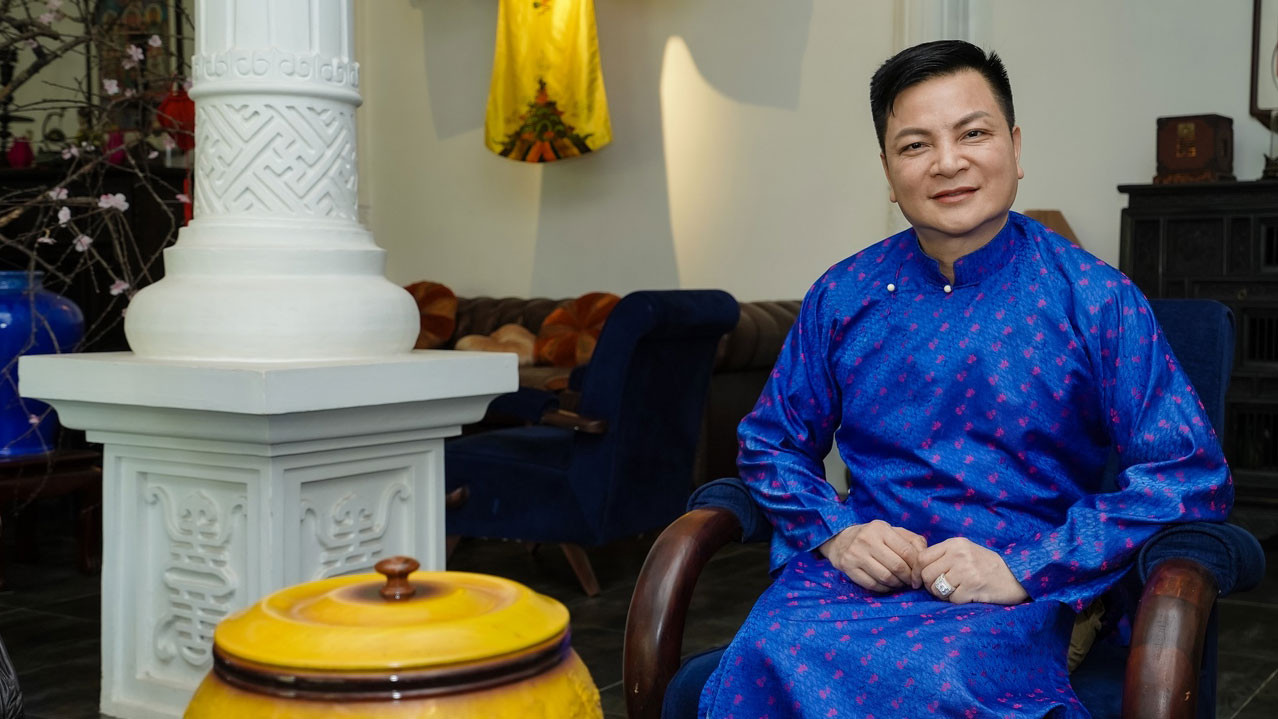Recognised by UNESCO as a Representative Intangible Cultural Heritage of Humanity since 2016, the Worship of Mother Goddesses of the Three Realms of the Vietnamese people not only continues to maintain a special role and position in people’s spiritual lives but also affirms Vietnamese identity in the common cultural flow of humanity.
‘Live museum’
Considered as a “live museum” which preserves history, heritage and cultural identity of Vietnamese people, the Mother Goddess Worship of the Three Realms artistically combines folklore elements such as costumes, music, ‘chau van’ (spiritual singing), dance and folk performances in ‘hau dong’ (spirit mediumship) rituals and festivals.
In 2016, UNESCO inscribed the practice of Mother Goddesses of the Three Realms Worship on the Representative List of the Intangible Cultural Heritages of Humanity. Accordingly, belief of the Mother Goddess Worship not only maintains its role and position in spiritual life of Vietnamese people but also affirms the country’s cultural identity in the common flow of human culture.
According to the Department of Cultural Heritage under the Ministry of Culture, Sports and Tourism, the Worship of Mother Goddesses of the Three Realms is a practice of worshiping the Mother, who is the embodiment of nature. People worship Holy Mother Lieu Hanh and other goddesses who govern the sky, land, rivers and mountains as well as historical or legendary figures who have made great contributions to the country and people.

Legend has it that Holy Mother Lieu Hanh was a fairy who descended to earth and then took refuge in Buddhism. She is honoured as one of the four immortal deities of Vietnamese mythology. Since the sixteenth century, this has become a cultural and religious activity that has had profound influence on social life and people's mindset, meeting the needs and aspirations of everyday life.
The Worship of Mother Goddesses of the Three Realms was practiced in the north-western, north-eastern, northern and north-central regions and Ho Chi Minh City. It has spread to many localities around the country. Nam Dinh Province is one of the localities considered to have many typical centres of worshiping Mother Goddess Lieu Hanh, including places that preserve the legend of her descendants, such as Phu Day, Phu Nap and nearly 400 other temples.
The actors of the heritage are ‘thu nhang’ (temple guardian), ‘thay cung’ (shaman), ‘thanh dong’ (medium), ‘hau dang’ (assistants), ‘cung van’ (vocalists), disciples, followers and the community of residents who share a common belief in the capacity, the ultimate power and the patronage of the Goddesses, led by Holy Mother Lieu Hanh.
They stick together into a group to practice the worshiping rituals, joining festivals and performing the ritual of ‘hau dong’ at the temples and palaces worshiping Mother Goddesses. ‘Hau dong’ is the most important ritual of Mother Goddesses Worship, a form of spiritual performance and a “live museum” of Vietnamese culture.
The practice and participation of the ‘hau dong’ ritual and festive activities aim to pray for good health, luck and happiness as well as express the people’s aspirations in daily life and direct them to a harmonious and integrated living attitude. The Worship of Mother Goddesses, the symbol of the supreme mothers, contributes to upholding the value and role of women in family life and society in Vietnam.
In addition to the practice of festive activities, ‘hau dong’ ritual and ‘hat van’ (a form of hymn singing) with folklore elements such as costumes, music and dance, are displayed artistically in association with the belief of Mother Goddesses of the Three Realms worship, is also a way to preserve the history, heritage and cultural identities of Vietnamese people.

Regarding the Worship of Mother Goddesses, ‘hau dong’ (spirit mediumship) is among the rituals which are considered mysterious and receive the most attention.
Later Prof. Dr. Ngo Duc Thinh, who has been devoted to many studies on Dao Mau (Mother Goddess religion), explained that it is the embodiment ritual of the saints into the body of male and female mediums. Therefore, mediums are considered to have a special ability to contact the gods and goddesses; meanwhile, people who participate in the ‘hau dong’ ritual believe that the mediums help them to connect with the gods and goddesses.
“In a ‘hau dong’ performance, we can see the way of thinking, the way of life, the conceptions of life, the way of eating (cuisine), the way of dress, the way of living, and the rituals of our ancestors, as well as admire the embodiment of gods.”, noted Artisan Nguyen Duc Hien, Deputy Director of the Vietnam Institute of Culture and Belief.

Throughout the process of formation and development of the belief of Mother Goddesses Worship of Vietnamese people with many historical events, the key role of mediums has not changed as they have been always considered the “fire keepers” for this traditional belief.
According to Prof. Dr. Vu Minh Giang, Deputy Head of the Vietnam Association of Historical Sciences (VAHS) under the Vietnam National University in Hanoi (VNU), everyone has a special ability. The ability of the mediums is to receive so-called special spiritual signals that ordinary people do not have.
In the development trend of the current era, the Worship of Mother Goddesses of the Three Realms was honoured by the UNESCO. Therefore, the responsibility of mediums and temple guardians is more important ever.
In addition to maintaining, preserving and promoting the spiritual and cultural values of the belief, it is necessary to harmoniously combine it with contemporary factors towards making the Worship of Mother Goddesses a beautiful image in the eyes of the international friends and the social community.

A hau dong performance at the Vietnamese Embassy in India

A lecture on Mother Goddess Worship at VinUniversity
Referring to the role of mediums, Artisan Nguyen Duc Hien, said mediums are the creator and ‘owner’ of the worship. The mediums play a role of leading and guiding participants as well as preserving and transmitting the practices of Mother Goddesses worship and developing the spaces for this belief.
The guidance mediums provide for followers and disciples can also take place in an indirect form as the development of internet technology allows mediums to communicate with their disciples and followers through social networking, including Facebook. However, it can be said that mediums themselves are the examples for disciples and followers. If mediums are honest people, their disciples will surely follow them.
“In terms of preserving and transmitting folklore values to future generations, the mediums are truly folk artists. Like the artisans of Xoan singing (a community performance art from northern Vietnam), Quan ho (love duet singing) and Vi Dam (two kinds of folk music from the central provinces of Nghe An and Ha Tinh), mediums in ‘hau dong’ pass on knowledge and practice of this belief to their disciplines and followers”, said cultural artisan Nguyen Duc Hien.
According to artisan Nguyen Duc Hien, with its role of preserving and transmitting the religious practices to generations of disciples, mediums have made important contributions to maintaining this belief and helping it recognised by the UNESCO as an intangible cultural heritage of the humanity.
Stephen Lindhorst from Vin University had the opportunity to enjoy a ‘hau dong’ performance by artisan Nguyen Duc Hien and expressed his surprise at the dance, the music and the costumes that were used in the performance. “The medium’s role is the connection and the mediator between the mother goddesses. Hien is a man but then also has the embodiment of the Mother Goddesses, I find that fascinating. I think that this tradition needs to be preserved”, he noted.

Mediums are the creators and owners of the Mother Goddess Worship. Artisan Nguyen Duc Hien
Dr. Le Thi Minh Ly, Vice President of the Cultural Heritage Association of Vietnam (CHAV), emphasised that UNESCO's recognition aimed to identify the cultural value of the Worship of Mother Goddesses.
Before 1990, when there was no comprehensive innovation in all aspects, many people considered the practice of Mother Goddesses of the Three Realms Worship outdated and superstitious. Later, when Vietnam strengthened its deep integration into global cultural life, the public awareness changed. The community realised that this religious practice has obvious cultural values that have been maintained and transmitted by many communities.
As a result, ‘hau dong’ ritual in the Worship of Mother Goddesses has not been deformed. Dr. Le Thi Minh Ly said the most important thing is still the awareness. In particular, the efforts of each individual in maintaining and promoting the standard values of the belief are very necessary, especially in the context of deformed variations. Notably, the mediums’ role in preserving and promoting the heritage’s values and propagating the correct practices of the heritage is very important.
Source: Nhan Dan